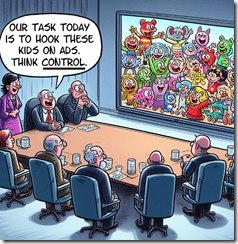Kiddie Control: Money and Power. What Is Not to Like?
January 2, 2024
 This essay is the work of a dumb dinobaby. No smart software required.
This essay is the work of a dumb dinobaby. No smart software required.
I want to believe outputs from Harvard University. But the ethics professor who made up data about ethics and the more recent the recent publicity magnet from the possibly former university president nag at me. Nevertheless, let’s assume that some of the data in “Social Media Companies Made $11 Billion in US Ad Revenue from Minors, Harvard Study Finds” are semi-correct or at least close enough for horseshoes. (You may encounter a paywall or a 404 error. Well, just trust a free Web search system to point you to a live version of the story. I admit that I was lucky. The link from my colleague worked.)
The senior executive sets the agenda for the “exploit the kiddies” meeting. Control is important. Ignorant children learn whom to trust, believe, and follow. Does this objective require an esteemed outfit like the Harvard U. to state the obvious? Seems like it. Thanks, MSFT Copilot, you output child art without complaint. Consistency is not your core competency, is it?
From the write up whose authors I hope are not crossing their fingers like some young people do to neutralize a lie.
Check this statement:
The researchers say the findings show a need for government regulation of social media since the companies that stand to make money from children who use their platforms have failed to meaningfully self-regulate. They note such regulations, as well as greater transparency from tech companies, could help alleviate harms to youth mental health and curtail potentially harmful advertising practices that target children and adolescents.
The sentences contain what I think are silly observations. “Self regulation” is a bit of a sci-fi notion in today’s get-rich-quick high-technology business environment. The idea of getting possible oligopolists together to set some rules that might hurt revenue generation is something from an alternative world. Plus, the concept of “government regulation” strikes me as a punch line for a stand up comedy act. How are regulatory agencies and elected officials addressing the world of digital influencing? Answer: Sorry, no regulation. The big outfits are in many situations are the government. What elected official or Washington senior executive service professional wants to do something that cuts off the flow of nifty swag from the technology giants? Answer: No one. Love those mouse pads, right?
Now consider these numbers which are going to be tough to validate. Have you tried to ask TikTok about its revenue? What about that much-loved Google? Nevertheless, these are interesting if squishy:
According to the Harvard study, YouTube derived the greatest ad revenue from users 12 and under ($959.1 million), followed by Instagram ($801.1 million) and Facebook ($137.2 million). Instagram, meanwhile, derived the greatest ad revenue from users aged 13-17 ($4 billion), followed by TikTok ($2 billion) and YouTube ($1.2 billion). The researchers also estimate that Snapchat derived the greatest share of its overall 2022 ad revenue from users under 18 (41%), followed by TikTok (35%), YouTube (27%), and Instagram (16%).
The money is good. But let’s think about the context for the revenue. Is there another payoff from hooking minors on a particular firm’s digital content?
Control. Great idea. Self regulation will definitely address that issue.
Stephen E Arnold, January 2, 2023



